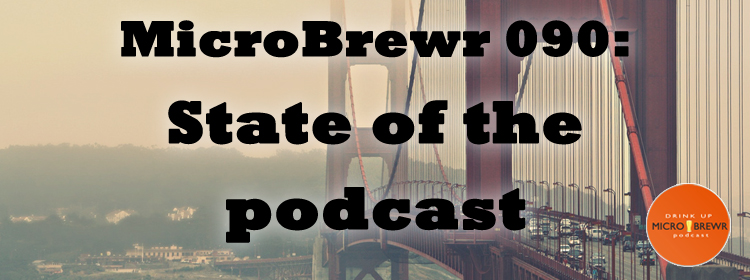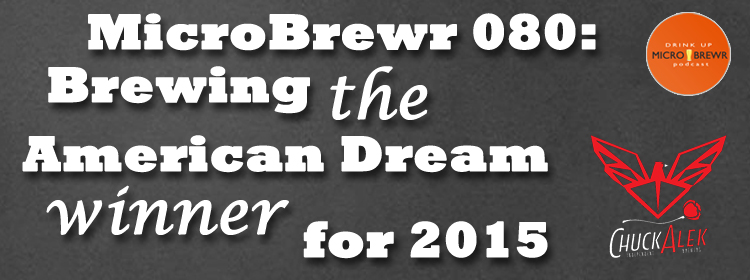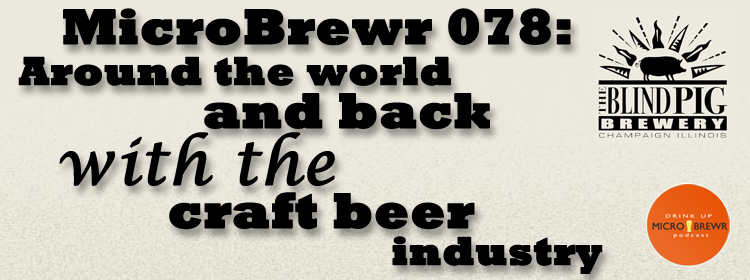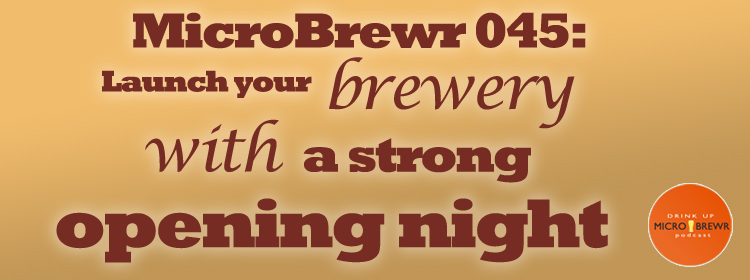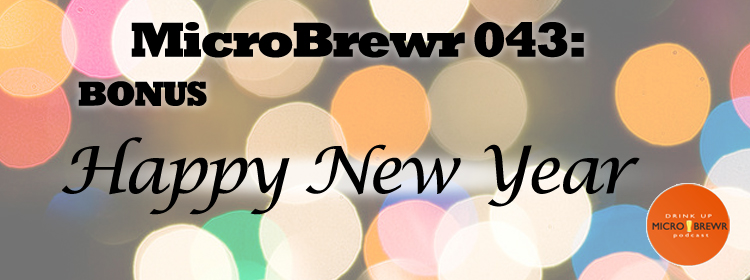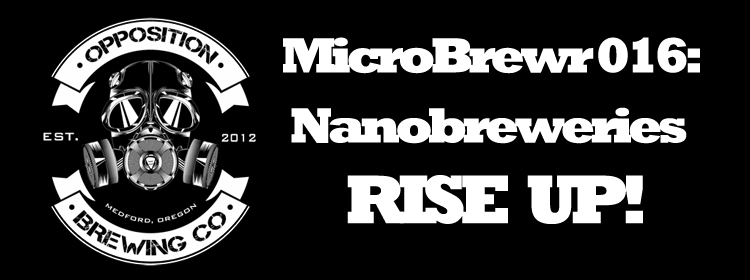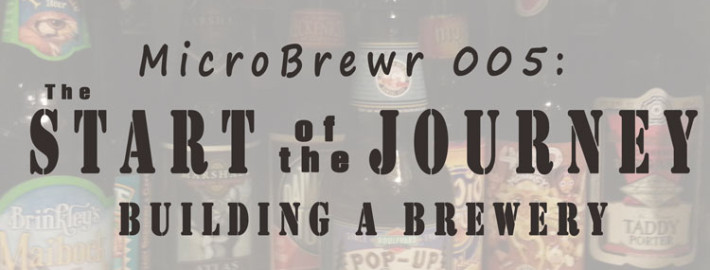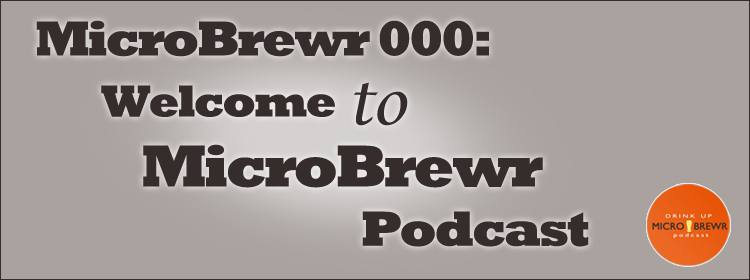MicroBrewr 090: State of the podcast
Podcast: Play in new window | Download | Embed
Subscribe: RSS
TRANSCRIPT:
Welcome to MicroBrewr podcast. Where we talk about everything craft beer related, but especially for if want to start your own microbrewery or take your existing brewery to the next level.
As usual, I’m Nathan Pierce, the host of MicroBrewr Podcast.
So I just want to give you a short update today. This is going to be kind of a “state of the podcast” address to let you know some recent developments in my life that could potentially affect the future of MicroBrewr.
So I just want to be transparent and honest and let you know what to expect.
This is going to be just a short review of the past year for MicroBrewr and also an update of my plans to start a brewery, because some people ask about that. Myself wanting to start a brewery, has sort of become the premise of a lot of MicroBrewr, so I’ll talk briefly about that.
MicroBrewr in 2015
Before we get to that, let’s sort of recap the last year of MicroBrewr. I want to use this time and sort of step back to reflect and see what sorts of lessons we have gotten from the last year of learning how to start a brewery.
At the end of 2014, on New Year’s Even we had a similar episode, the year in review episode. It was a good time to reflect and project on the future at the time of MicroBrewr. That was episode 43 of the podcast, I had done 30 episodes since taking over for MicroBrewr founder Joe Shelerud. Now this is episode 90, so we’ve done 47 episodes since then.
We started off the year with episodes of MicroBrewr Podcast organized sort of in series. We had series on:
- Breweries as co-ops
- Podcasting for breweries
- Women in craft beer
- Marketing and promotions
- Business plans, funding, and insurance
- Contract brewing
- Gluten-free beer and cider
Among these series we had other interviews about
- Trademark issues
- Mobile canning
- Organizing a great opening night
- Making whiskey from craft beer
- A bunch of other breweries
So we’ve learned a ton of great info. Lots of things just never would have occurred to me.
The sense of community in the craft beer industry is really prolific and prevalent. Community really is exemplified the most when the business is organized as a cooperative. There a few ways that can happen, like a consumer co-op or a worker owned co-op, but either way, it’s all about people working together to help everyone out. Costs as well as profits are spread out more evenly, everyone contributes and everyone has a sense of ownership and pride. So it really brings out the best work, the best product quality, and the most benefits for a larger number of people.
Anyway, it was really cool to see how much the co-op movement is growing within craft beer. Just through the course of this past year, there are a lot more co-op breweries starting all over the country.
Another thing I have learned is that cider is really cool! We started the gluten-free series with Bard’s Tale Beer Company, but then we went into cider and talked with Common Cider Company, 101 Cider House and Wandering Aengus Ciderworks. Some of the stats we heard about the growth of cider, even just that cider was way more popular than beer in the U.S. before Prohibition, is pretty cool. The growth alone, from a business standpoint, makes you gotta look. But something that stands out the most for me is how cider is sort of closer to a natural product, kind of the way wine is viewed in that regard, but cider attracts the cool, open-minded, experimental people of the craft beer world. So it’s like the best of both things. And that’s really attractive to me. The gluten-free aspect is a bonus because some people in my life are allergic to gluten. I can eat gluten, but it’s kind of a bummer to think they can’t enjoy most beers that I could have.
Anyway, we’ve learned so much this year. It’s so rewarding to receive emails from literally around the world telling me how much you have learned from the podcast and the blog, telling me your cool stories of starting your own brewery, or just thanking me for doing this.
I do put in a lot of time on MicroBrewr. Maybe someone else could do it more efficiently, I didn’t realize when I took this on that I was getting into the whole blogging world. Wow, what an eye-opening experience that has been.
There’s a whole segment of the population with online journals or full-on internet media outlets. Some people do it for fun on the side, some people make an ok living at it by itself. Believe it or not, some people are bringing in very lucrative incomes from blogging and podcasts and such. I am not one of those people.
With as many hours as I put in, MicroBrewr does make some money. It’s a little bit more than the expenses of just keeping it online.
MicroBrewr in 2016
So, this is where I’m going with that, I did get a job. It is not a job in the craft beer industry. It is a full-time job. I will be paid a good wage and I won’t descend into oblivion of despair.
I signed an offer letter with the City of San Francisco. I’ll be doing grants work, similar to what I was doing at my last job, where I worked for 7 years, so that’s where I’m most skilled in the workforce. And it feels really good to be gainfully employed again, and especially putting my skills to work, even though I haven’t yet started working. Hopefully by the time you hear this, I’ll be filling out the paperwork, going through orientation and all that stuff. I’m eager to do my best work and give them all I can to make the City of San Francisco an even better place. It’s a 3-year position and who knows, maybe continue after that.
I’m excited—and a little intimidated—to be moving to San Francisco. I’ve never lived in a big city before. It’s fun there. It’s diverse. It’s exciting. There are a lot of breweries, and cideries, and even a few distilleries. Not to mention the ocean and the Golden Gate Bridge and lots of bike lanes all these exciting things.
So please wish me luck, wish me well. I don’t know exactly when or if ever I’ll be able to start a brewery. Maybe if I don’t get to continue on with the City after 3 years, I’ll get to open a cidery then. Or maybe I’ll keep working for the City of San Francisco and open a brewery on my spare time like Marta Jankowska from ChuckAlek Independent Brewers. In the meantime, I have to give my employer my best work and this is my priority.
So this means, I’m seriously wondering how I’ll be able to keep MicroBrewr going.
The whole point of MicroBrewr was to learn how to start a brewery. And I learned some things.
If 2014 was the year of the nanobrewery for me, 2015 was the year of cider for me.
Before I started doing MicroBrewr Podcast, talking to brewers, brewery owners, and other experts from the craft beer industry every week, I was not open to a nanobrewery as a business model. I just thought it wasn’t profitable. But now I’ve talked to enough people who are making profits, that now I see it can be a good way to get off the ground, maybe just keep being a neighborhood brewery thing, but hopefully a stepping stone to larger things.
I also wasn’t open to cider. I thought it was too small of a niche, kind of a novelty, and just not that interesting. Now I see that the segment is growing explosively, and compared to other countries the U.S. has a ton of growth potential. Even just looking at where the U.S. was before prohibition, it looks like the U.S. cider market is not something to ignore. And people are doing some interesting things with cider, being really creative with it, bringing back some really neat recipes and fruits that almost disappeared and even doing brand new stuff that has never been done before with cider.
So if I have to stop producing new content on MicroBrewr, I hope I’ve learned enough to start a brewery—after 90 episodes I hope I’ve learned enough! At some point I have to stop learning and start doing. Hopefully there’s enough content to help you open the brewery of your dreams—maybe sooner than I. I hear from people who just found the podcast and they’re burning through an episode every day. They don’t have to wait a week for a new episode to come out like me and you who have caught up through the current ones.
Ok so where were we?
MicroBrewr in the future
I want to keep doing MicroBrewr, I really do. I don’t want to let you down. It’s a lot of fun. If the episodes don’t come out on time, every Tuesday as they have been going, well, you know why. Work is my priority going forward.
Maybe I can try and find some help to take some of the tasks and make it easier to keep going. I don’t know, it’s a whole new world for me. I’m going back to work full-time for the first time in 2 1/2 years. And I’m moving to the big city and all of that. it’s going to be a huge adjustment in lots of ways.
I just looked back at that year in review episode, from New Year’s Eve last year, and I saw that I was looking for jobs all over, preferably a job in craft beer, but even a job in anything. And now I’ve got that. So we’re moving forward.
We’ll see what the future holds. Start your breweries, send me emails, I will live vicariously through you! We will drink good beer! Life will be good!
Image showing San Francisco. by Kathryn, on flickr (CC BY 2.0) was modified from its original state.
Support MicroBrewr
Help keep MicroBrewr on the air. CLICK HERE for ways you can help.

